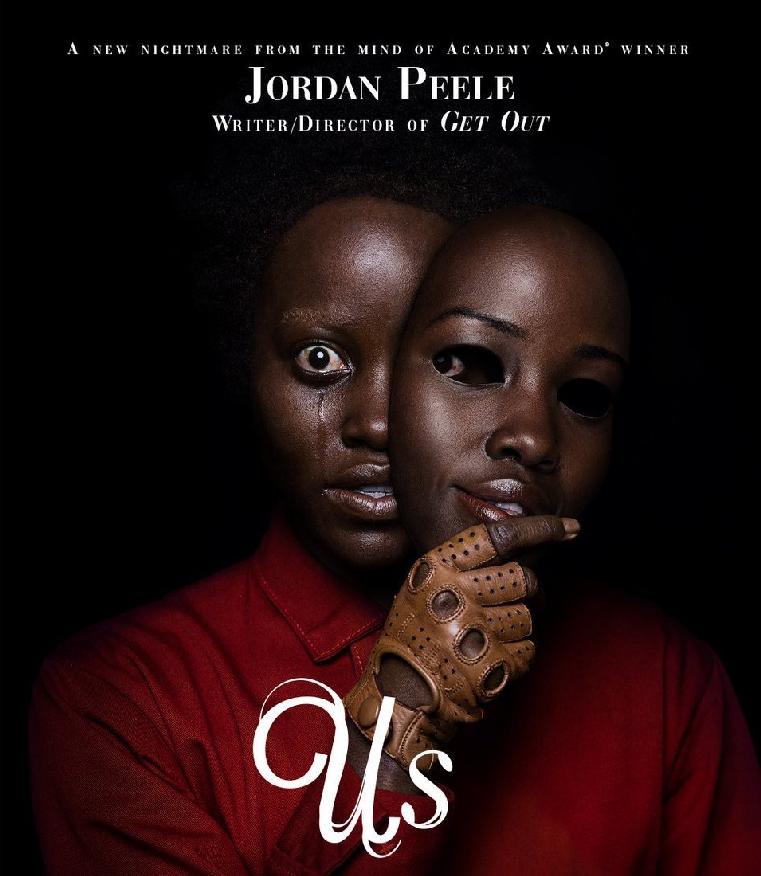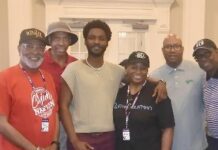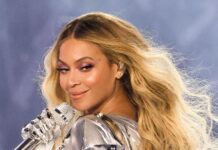*With 2019 on pace to be a record year at the U.S. box-office, it is worth noting that almost halfway through, after offerings that have includes Avengers and Aladdin, Godzilla and the X-Men, Captain Marvel and John Wick, that the 4th-highest grossing domestic film so far this year is Jordan Peele’s “Us”.
This is, no doubt, due to fevered anticipation after Peele’s first film, “Get Out”, was a critical and commercial smash. Still in theaters and released on DVD and Blu-Ray June 18th, the question must be asked: Did “Us” deliver on and fulfill its expectations?
That would be a negative.
It must be stressed that this is no way a reflection on Lupita Nyong’o, who is absolutely magnificent.
OTHER NEWS YOU MIGHT HAVE MISSED: Post Attack by Kamala Harris, Joe Biden Appeals to Black Audience in Chicago – WATCH

The film starts out with an interesting enough premise. Nyong’o plays Adelaide. In the first scene, as young Adelaide Thomas (Madison Curry wears her “Thriller” t-shirt in 1986, while on vacation with her parents in Santa Cruz, she wanders off on the beach while her father is playing whack-a-mole. She enters a funhouse, where she encounters a doppelganger of herself in the Hall of Mirrors. When her parents and we then find her, she is unable to speak.
Flash-forward to present day, and an adult Adelaide (Nyong’o), now married with children named Zora and Jason ( Shahadi Wright Joseph and Evan Alex) and going by the name Adelaide Wilson. Having long since recovered her speech, Adelaide is apprehensive about returning to Santa Cruz, but her husband, Gabe (Winston Duke), dismisses her fears, while being preoccupied with impressing their rich, white friends, Josh and Kitty Tyler. (Tim Heidecker and Elisabeth Moss). They meet the Tyler family at the Santa Cruz beach, where Adelaide learns that the Tylers that Gabe wants to strive to be so badly don’t seem to have happiness or harmony to equal their wealth, which would seem a subtle class, race and just human issue to subtly explore.
However, Jason wanders off when he sees a man standing alone with blood dripping from his hands. When Adelaide discovers Jason is missing, it brings all her childhood trauma and suppressed fears to the fore and she demands to leave after they find him.
At this point, the dynamic of the marriage between Adelaide and Gabe is fascinating. Rather than a testosterone fueled male, Gabe is very easygoing. Comfortable in his routine and lifestyle. Still putting his nose to the grindstone to achieve the American dream, but coming off more as, say, Kevin James than Michael B. Jordan.
The stress of exploring Adelaide’s psychological complexity is dealt with for a short time, and then….it happens.
At night, a family of four dressed in red appears in the Wilsons’ driveway. They break into the Wilsons’ home and attack them. The Wilsons quickly realize the four intruders are doppelgangers of themselves.
Experience the mysterious, socially-provocative film from Academy Award winner @JordanPeele#UntetherTheTruth with 50+ mins of revealing Bonus Content
Own #UsMovie on Digital 6/4 and Blu-ray & DVD 6/18 https://t.co/XqYELHL898 pic.twitter.com/E9pesbKowI— Us (@UsMovie) April 30, 2019
At that point, in the darkness, with the realization setting in and the tension growing, the doppelgangers are asked who they are. But, they don’t respond with “Your worst nightmare”, “A better you”, “A part of you which you want to pretend doesn’t exist”… No, Red, Adelaide’s doppelganger – and the only doppelganger who speaks – instead bizarrely says, “We’re Americans!”
Say what? Oh, that’s right. Peele has to make it obvious he wants to be socially relevant or something.
At this point, though, as both Adelaide and Red, Nyong’o plays people extremely complex who kick ass. She was so impressive, it was close to Oscar-worthy – and definitely was enough to place her in the category of kick-ass horror queen, like a more complex, formidable Jamie Lee Curtis. But then, when do many subtle personal and political issues were ripe to be explored, and the mystery of who these doppelgangers are and the thrill of having them go up against their doubles starts to reach a crescendo, Peele decides being taken seriously is more important than giving his audience catharsis, conflict and chills.
Rather than being content with having the old trope of having a black person be the first one killed turned on its head and obliterated by the Wilsons fighting and overcoming their nightmarish mirror images, Peele decides instead to make the movie grandiose, about supposed big, important ideas – and the film goes off the rails as a result.
We find that it’s not just the Wilsons facing doppelgangers, but the Tylers, as well. This makes the Wilsons’ situation less unique and special, which is only amplified to the nth degree when they discover that millions of doppelgangers are attacking their originals, which makes the Wilsons’ dilemma less unique, intimate and pulse-pounding. After all, if they live, what world are they going to be living in? What’s the point? Also, since only Red speaks, we have no idea what their goal is.
Then, in yet another moment of excessively grand nonsense, Peele has the doppelgangers hold hands nationwide. This is supposed to represent Hands Across America, xenophobia, American privilege and a whole bunch of other pablum that lacks clarity and takes away from the terrific, terrifying film he had built up to that point .
The remainder of the film has some fine performances by everyone and a huge curve that also undermines what should have been a moment of triumph.
If Peele had kept his film more modest and subtle, he would have a beloved classic that would be treasured forever. By prioritizing ambiguous “important social messages” every chance he gets, he makes
“Us” lose it’s oomph.
We Publish News 24/7. Don’t Miss A Story. Click HERE to SUBSCRIBE to Our Newsletter Now!





